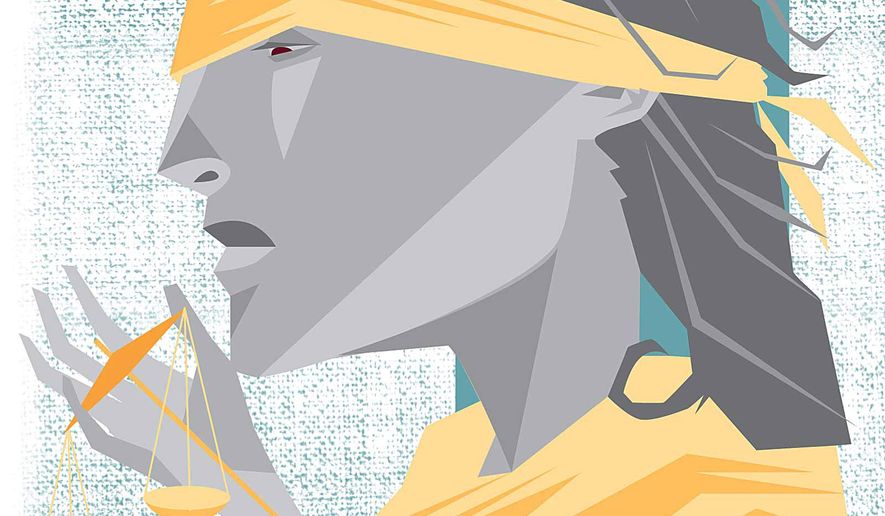OPINION:
Americans rely on fair and impartial courts to safeguard the rights and freedoms they hold dearest. We can be confident in the courts’ authority to safeguard those rights only if we believe that judges are upholding the rule of law, ensuring fairness and fulfilling their obligations with objectivity and neutrality. This is what is meant by the guarantee of due process that is enshrined in our Constitution.
At the end of February, the U.S. Supreme Court will hear arguments in Williams v. Pennsylvania, a case that highlights how vital it is that a judge be impartial, fair and neutral, and that bias or the appearance of bias must not taint the fairness of judicial proceedings.
As the Philadelphia district attorney, Ronald Castille’s office prosecuted Terry Williams. The office decided to seek and ultimately won a capital conviction against him, and then opposed Mr. Williams’ appeals, including one key appeal it lost: a lower court found the office had illegally failed to disclose evidence favorable to Mr. Williams at trial. The court vacated his death sentence and ordered a new sentencing hearing.
The district attorney’s office, which appealed the order to the Pennsylvania Supreme Court, was then under new leadership because Ronald Castille had become the chief justice of that very court, having campaigned for his seat in part on the number of death penalties, including Mr. Williams,’ his office had secured.
Not surprisingly, Mr. Williams’ lawyers believed Chief Justice Castille had a conflict of interest and asked him not to consider the case, or at least to ask his fellow justices whether they thought he had a conflict.
Instead, he unilaterally denied the request and heard the case. Together with the other justices, Chief Justice Castille reversed the lower court’s findings about his former office’s misconduct and sent Terry Williams back to death row.
In our view, Chief Justice Castille was wrong when he decided to review the case. The law regarding judicial behavior does not rest on the personal capabilities, discipline, or ethics of any particular judge, but rather on broader concerns that implicate the entire judicial system. Thus, even if Chief Justice Castille felt he was capable of adjudicating the case impartially, he was wrong to do so.
The U.S. Supreme Court has said that judges “hold the balance nice, clear, and true between the state and the accused.” To preserve this balance, and the public trust, there can be no bias, nor any appearance of bias.
The Constitution says that judges should remove themselves from considering a case in two broad situations. One is if a judge would be unlikely to be able to decide a case fairly based on his or her relationship to one of the parties. The other is where the threat of impartiality exists because the judge has a direct interest in the outcome of the case. Here, both factors were present.
We, along with many other former judges, have urged the Supreme Court to find that Chief Justice Castille’s prior relationship to the case created an impermissible risk of bias. As the former district attorney, Chief Justice Castille personally, in a handwritten note, authorized seeking the death penalty for Mr. Williams. Moreover, he used the Williams death verdict to support his campaign for the Supreme Court seat. And finally, considering the case required Chief Justice Castille to evaluate a court’s finding of misconduct against the office over which he formerly presided.
As former chief justices of state supreme courts, we well understand that judges should not casually decide to remove themselves from cases. But under even the strictest application of the law, Chief Justice Castille should not have considered Terry Williams’ case. Appellate judges, as we were, are members of a panel of judges and know well the collaborative nature of judicial deliberations. They exercise independent judgment, but they do not operate in a vacuum and their views are unavoidably affected by those of their colleagues. To the rest of the court, Chief Justice Castille’s bias and personal interest would have served at best as a distraction and, at worst, as an influence, affecting the ability of the entire court to objectively evaluate the merits of Mr. Williams’ case.
Impartial tribunals, free of actual and apparent bias, ensure the public trust in the courts and the rule of law. Chief Justice Castille’s failure to remove himself from Terry Williams’ case undermined the fairness of the proceedings, and damaged our criminal justice system as a whole. We have urged the U.S. Supreme Court to agree, and to reaffirm the importance of a judiciary that acts fairly and without conflict.
• Gerald Kogan was the assistant state attorney and chief prosecutor in the Dade County, Florida State Attorney’s Office and served as the chief justice of Florida Supreme Court from 1996 until his retirement in 1998. Michael Wolff served as judge of the Supreme Court of Missouri from 1998 2011 and was chief justice from 2005-2007.




Please read our comment policy before commenting.